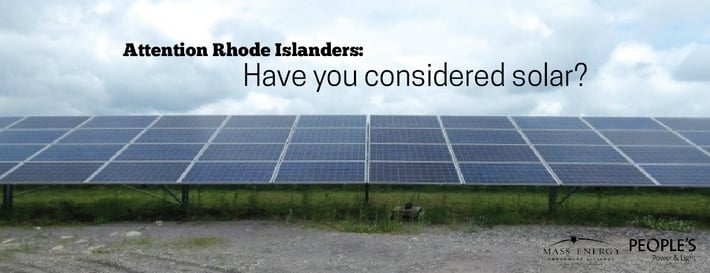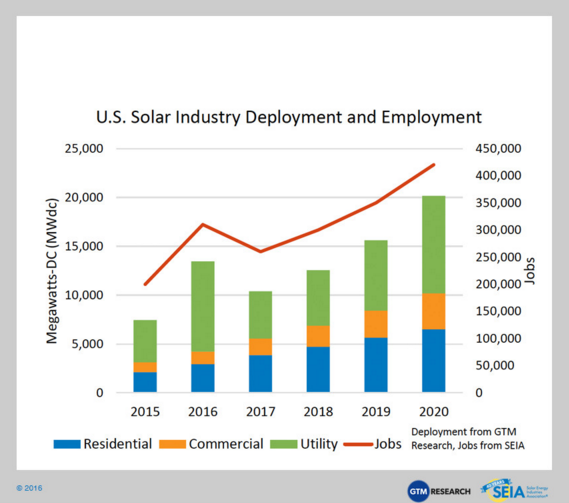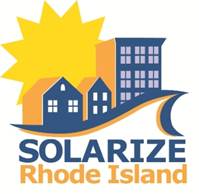
2016 is looking good for solar in Rhode Island. People’s Power & Light (PP&L) is still looking into options to launch our own solar program, but in the meantime we want to share some resources that you can use to install solar this year.
There are several policies and incentives in place to help folks purchase or lease a new array on their homes. While putting up solar has become easier, navigating the various options can be difficult. A good place to start is the Office of Energy Resources (OER) website where you can find various state solar incentives (such as the Renewable Energy Sales Tax Exemption) and a list of certified renewable energy installers in Rhode Island.
A professional solar installer will help you find a program or combination of policies that are a great fit for your home and finances.
Below are some incentives and resources you should consider when choosing to install solar:
Renewable Energy Growth Program
The Renewable Energy Growth (REG) Program was approved in 2014 sets an ambitious yet attainable target of adding 160 megawatts of renewable energy to Rhode Island’s electric grid from 2015-2019. National Grid pays REG customers a Performance Based Incentive for their solar production and environmental attributes.
Eligibility:
Small scale solar has a nameplate capacity of 25 kW or less of direct current (DC). The project must complete the interconnection application to be approved; if a project is not approved for the interconnection process, it will not be eligible for the REG. If it meets all requirements, a project receives its eligibility certificate that specifies the Performance Based Incentive and then it must be operational within 24 months.
Financial Support:
Performance Based Incentive (PBI) depends on project size. This is a tariff based incentive program and payments are available for 15-20 year spans.
| Renewable Energy Class |
System Size |
Ceiling Price/Standard Performance Based Incentive (per kWh) |
Term of Service |
| Small-Scale Solar I, Host Owned |
1 – 10 kW |
41.35 ₵ |
15 year tariff |
| Small-Scale Solar I, Host Owned |
1 – 10 kW |
37.75 ₵ |
20 year tariff |
| Small-Scale Solar I, Third Party Owned |
1 – 10 kW |
32.95 ₵ |
20 year tariff |
| Small-Scale Solar II |
11 – 25 kW |
29.80 ₵ |
20 year tariff |
Timing:
Each program year has an annual MW target for the small scale project class. A program year is April 1 to March 31 (unless otherwise approved by the Commission).
Details:
According to the National Grid website, “As of Dec. 1 2015 Small Scale Solar projects totaling 551 kW DC of nameplate capacity have been awarded a Certificate of Eligibility in the RE Growth Program. Therefore, 2,449 kW of the 3,000 kW 2015 annual enrollment target remain available”. Until the annual target is met, project applications will continue to be accepted. Residential customers must install an array that does not exceed their historic or estimated annual load, meaning the project should roughly match the home’s energy usage.
Federal Tax Credits
The federal tax credit has been a game changer for solar development - and good news! It was recently extended for another five years. The solar investment tax credit (ITC) is a “dollar for dollar” reduction in income taxes that a resident or business claiming the credit would otherwise pay the federal government.
Eligibility
Both residential and commercial solar projects are eligible.
Financial Support
The total amount for the tax credit depends on the project size. Taxpayers can claim a credit of 30% of qualified expenditures, such as labor on-site, assembly of the system, wiring to interconnect the home, etc. There is no maximum credit.
Timing
Must install before December 31, 2019 to benefit from the tax credit. After that date, the credit percent begins to decrease.
The following chart from the Solar Energy Industries Association shows how important the tax credit is to solar energy development over the next few years.

SOURCE: http://www.seia.org/research-resources/impacts-solar-investment-tax-credit-extension
Solarize Rhode Island
Solarize Rhode Island helps communities install and own solar panels from a reputable installer. Installers can offer lower prices for solar arrays by concentrating their efforts in specific areas. If more residents in a community sign-up, the price continues to decrease for everyone who participates.
Eligibility
Currently the Solarize program is available to residents of Barrington, Foster, South Kingstown, Warwick, and Aquidneck Island (as of Spring of 2016, Solarize is now available to the residents of Warren, Bristol, and Providence). If you live in another community in Rhode Island, the Solarize program can still help you find out if your home is good for solar.
Timing
Heads up! You must sign a contract by February 15, 2016 to take advantage of the Solarize special pricing and incentives. For folks in other municipalities, your town may be next for Solarize.
Details
Rhode Islanders can take advantage of either the Renewable Energy Fund Grant or the Renewable Energy Growth program in addition to Solarize. Solarize Rhode Island benefits from the partnership of the Office of Energy Resources, Commerce Rhode Island, the John Merck Fund, and Smart Power.
Renewable Energy Fund
The Renewable Energy Fund (REF) is administered by the Commerce Corporation with assistance from the Office of Energy Resources (OER). It provides loans and grants for both preliminary feasibility studies and direct installation of solar projects. Rhode Islanders support the REF through a charge our on electric bills.
Eligibility
Residents, businesses, affordable housing users, and non-profits are all eligible for small scale solar. Applicants must apply within a solicitation period (specified on the Commerce Corporation website), but the REF supports solar arrays statewide.
Financial Support
You can reduce your solar costs by 30-40% using the REF. For each solar voltaic (PV) project, the REF will cover up to $10,000. Solar domestic hot water projects similarly can receive a maximum of $5,000 per housing or business unit.
Timing
Small scale projects are accepted in various blocks of solicitation periods. Block 9 commenced on Jan. 4th and applications are due March 25th 2016. The following Block 10 opens April 4th and runs until June 24th. The full application process can be found here on the Commerce RI website.
Details
The REF may be combined with Regional Greenhouse Gas Initiatives (RGGI) and other federal government funding programs, but it cannot be combined with the Renewable Energy Growth Program. Grants start at $1.15 a watt and an average residential system of 5.5 kW would qualify for a grant of $6,325.
Net Metering
Net metering allows distributed generation customers (locations with solar, wind or bio-mass on site) to meet some or all of their electric needs. A meter tracks the amount of power generated by the solar panels for the home. Any surplus is transferred onto the grid.
Eligibility
Homeowners, businesses, and municipalities with intermittent generators (including solar) can benefit from net metering.
Financial Support
Customers who use net metering can earn a bill credit for excess power that goes back into the electric grid. A solar array can produce up to 125% of the electricity consumer on-site and be credited for the power.
Timing
Ongoing.
2016 Launch: SolarWise
SolarWise is a program offered by National Grid that helps customers reduce their energy use and install a solar array at a competitive rate. It works with the Renewable Energy Growth program (REG), details above. What makes SolarWise unique is it pairs additional financial incentives if the customer elects to install efficiency upgrades with the solar array for their home. SolarWise also helps consumers shop for a developer and view bids in a simple platform.
Eligibility
Free solar PV assessments are now available as part of the EnergyWise efficiency audit. Any Rhode Island residential customer with National Grid is eligible for a no-cost energy efficiency assessment and therefore is eligible for a solar PV assessment. Consumers who recently had an energy audit are also eligible for SolarWise but instead would receive a Solar PV screening via email.
Financial Support
Participants in SolarWise are payed for solar output through a Performance Based Incentive (PBI). Those who elect to pair solar with energy efficiency initiative would receive a higher bonus PBI.
Timing
SolarWise kicked off on April 1st, 2016. Applications to the REG program must be received and approved before the close of the program year on March 31, 2017 to be eligible for SolarWise Bonus Awards.
Whether you green your electricity through the grid with Mass Energy or PP&L or through solar panels on your roof, you’re a clean energy champion.
Is there a policy or program we missed? Care to share your experience installing solar? Leave us a comment! We love to hear from you.
Remember to stay tuned for solar program updates via this blog, Facebook, or simply join People’s Power & Light’s solar mailing list by contacting us at greenreply@ripower.org or 401-861-6111.
Important Consideration: RECs
A major solar financial incentive available to anyone who owns panels is Renewable Energy Certificate (REC) sales. For every megawatt hour (MWh) of electricity that your panels produce, you can sell one REC. The price a REC fetches depends on demand for a solar REC stimulated by renewable energy mandates (such as RI’s Renewable Energy Standard). Whoever holds the REC can claim that they consumed the MWh of renewable electricity that it represents. So, if you sell your solar RECs you cannot claim that your home is powered by renewable energy and your electricity usage is not demanding more renewable energy on the power grid. Those benefits are transferred to the owner of the REC. Keep this in mind when you consider financing solar projects.
By putting solar on your home you are adding renewable energy supply to the grid, this makes you a hero. So, even if you must sell your solar RECs to finance the project, that’s OK. Just remember that you can be a solar generator without being a solar consumer.
House Not Right For Solar?
If your home isn't right for solar, you can still be a renewable energy consumer. You can make the switch to 100% local, renewable energy with Mass Energy and PP&L's green power program.





Comments